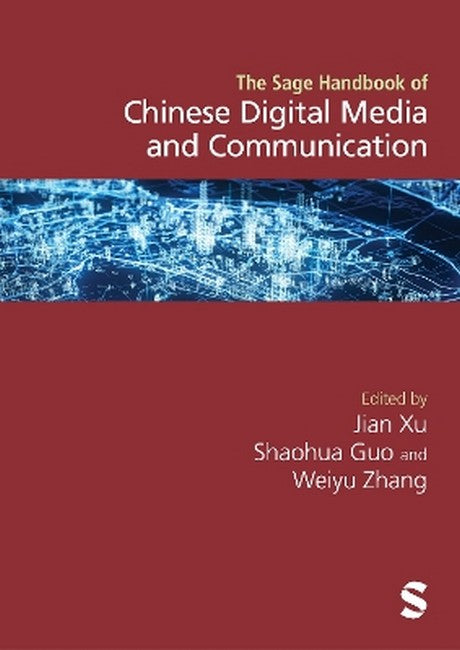Dr Jian Xu is Associate Professor in Communication in the School of Communication & Creative Arts, Deakin University, Australia. He is the co-convenor of the Asian Media, Culture and Society Research Group at Deakin University. He is Associate Investigator of the ARC Centre of Excellence for the Digital Child. He was a Research Fellow in Media (Deakin University), Endeavour Postdoctoral Research Fellow in the China Research Centre (University of Technology Sydney), Visiting Scholar in the Centre for Global Communication and the Centre for the Study of Contemporary China (University of Pennsylvania). He obtained his PhD in Media and Communication from the University of New South Wales, Australia. Shaohua Guo is Associate Professor of Chinese at Carleton College. Her research interests focus on contemporary Chinese studies, digital media studies, and cultural studies. She is the author of The Evolution of the Chinese Internet: Creative Visibility in the Digital Public (Stanford University Press 2021). Provost's Chair Professor Weiyu Zhang is Director of the Civic Tech Lab (www.civictechlab.org), currently located at the Department of Communications and New Media, National University of Singapore. Her research focuses on civic engagement and Information and Communication Technologies, with an emphasis on Asia. She has led on multi-nation projects on youth engagement, online deliberation, and civic tech in Asia. Her current interest is to develop and examine civic tech applications to facilitate citizen deliberation on science topics such as artificial intelligence, Covid-19 vaccines, climate change, and novel food.
Request Academic Copy
Please copy the ISBN for submitting review copy form
Description
Introduction - Jian Xu, Shaohua Guo and Weiyu Zhang Part 1: Activism, Civil Society and Politics Chapter 1: Digital vigilantism in China: Dynamics and politics in networked justice-seeking - Qian Huang, Yiming Wang & Yiran Ding Chapter 2: Digital media and contentious politics in Hong Kong - Francis Lee Chapter 3: Understanding China's digital feminism: Struggles, resilience, and businesses - Altman Yuzhu Peng & Fengshu Liu Chapter 4: China's digital nationalism: Narratives, technological affordance, practice - Florian Schneider Chapter 5: Digital environmentalism and non-confrontational activism in the lifeworld - Weiyu Zhang, Yu Sun, Ding Xiang Chua & Yun Lin Seet Chapter 6: Activism of no action: The lying-flat movement in Chinese cyberspace - Yuan Wang & Rongbin Han Chapter 7: Digital citizenship of young people in China - Jun Fu Chapter 8: Public opinion, Yulun and Yuqing - Dan Chen Chapter 9: Panda as the flagship of China's digital diplomacy: Rethinking the intersection of network and emotional narrative strategy - Zhao Alexandre Huang & Rui Wang Part 2: Technology, Regulation and Governance Chapter 10: China's internet governance path: From 'great country' to 'strong country' strategy - Gianluigi Negro Chapter 11: Civilisation, technology and surveillance in the Middle Kingdom - Michael Keane Chapter 12: Communication politics and the social credit system - Haiqing Yu Chapter 13: Big data and public health governance: A review of China's health code system during the Covid-19 pandemic - Wilfred Yang Wang & Pengfei Fu Chapter 14: 'Double-bind regulation' of private internet firms in China: Dilemmas, autonomy and resilience - Aifang Ma Chapter 15: Regulating Chinese livestreaming industries: Historical regulatory-industrial trends and current issues - Xiaofei Han Chapter 16: Tensions and contradictions in China's approach to AI Governance - Huw Roberts, Lujain Ibrahim, Junhua Zhu Chapter 17: China's digital publishing transformation: Platformisation, artificial intelligence, and regulatory complexity - Xiang Ren Part 3: Platform, Labor and Industry Chapter 18: Cross-cultural comparative platform studies: Insights from short video research - Xu Chen & D. Bondy Valdovinos Kaye Chapter 19: The 'unsettling' political economy of communication in China: State reconfigurations and financialization of digital news industries - Chenhao Ye Chapter 20: From Weibo to AI: How research on digital journalism reflects technological - Kecheng Fang & Youyi Wei Chapter 21: E-commerce and rural development: Taobao Villages in China - Anthony Li Chapter 22: Wanghong and the formation of ethical subjects in the Chinese creator economy - Jian Lin & Han Fu Chapter 23: China's digital fandom and platformized affective labor - Yiyi Yin Chapter 24: Reconsidering the globalization of Chinese digital games: A platformization turn - Gejun Huang Chapter 25: Gaming mobility: Players, industry, market and state rulemaking in China - Zixue Tai & Fengbin Hu Chapter 26: Chinese digital giant going out under digital transformation and platformization: Rethinking Tencent's pan-entertainment strategy - Wenjia Tang Part 4: User, Culture and Everyday Life Chapter 27: Digital media, Chinese diaspora, and new transnational subjects - A case study from Australia - Wanning Sun Chapter 28: Chinese gay men's digital media studies: A critical review - Weishan Miao & Jiacheng Liu Chapter 29: The Remaking of an Underclass in Digital China: Contested Voices, Disciplined Cultural Production, and a Rising Lumpen Internet - Jiaxi Hou Chapter 30: Internet literature in China revisited - Michel Hockx Chapter 31: Revisiting Web 2.0 via blogs: A comparative study of mainland China and Taiwan - Shaohua Guo Chapter 32: Digital parenting in China: State, school, and family - Xinyu Zhao Chapter 33: Routinizing Technology: Mobile Payments and the Reinvention of Social Interactions in China - Yipeng Xi Part 5: Method, Approach and Reflections Chapter 34: Digital ethnography in, on and through China: A methodological history - Gabriele de Seta Chapter 35: How to use computational methods and online experiments to study Chinese digital media - Yingdan Lu & Matt DeButts Chapter 36: Researching Chinese internet history: A social memory perspective - Shiwen Wu, Xiaoya Yang & Jian Xu Chapter 37: Researching China's digital economy: A critical political economy perspective - Min Tang

